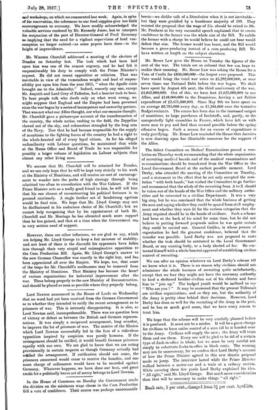The Select Committee on Medical Examinations palmed a reao- lotion
on Thursday week recommending that the whole organirstion of recruiting medical boards and of the medical examinations and re-examination.s should be transferred from the War Office to the Local Government Board at the earliest possible moment. Lord Derby, who attended the meeting of the Committee on Tuesday, read a statement to the effect that he not only accepted the reso- lution "with both hands," bet wished the Committee to go further and recommend that the whole of the recruiting from A to Z should be taken out of the hands of the War Office and the military autho- rities and be entrusted to a civilian Department. It was a very big step, but he was convinced that the whole business of getting the men and saying whether they could be spared front civil employ- ment and whether they were fit for the various categories that the Army required should be in the hands of-civilians. Such a scheme had been at the back of his mind for some time, but he did not believe in putting forward proposals unless lie was quite certain they could be carried out. General Geddes, in whose powers of organization he had the greatest confidence, believed that the transfer was possible. Lord Derby was not prepared to state whether the task should be entrusted to the Local Governmeut Board, or any existing -body, or a body elected ad hoe. Its cop- tented himself with a whole-hearted approval of establishing civilian control of recruiting.


































 Previous page
Previous page